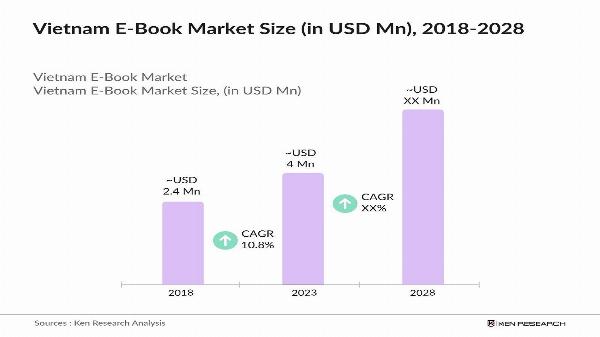Vietnam E-Book Market: Growth, Trends, and Future Prospects

The Vietnam e-book market has experienced substantial growth in recent years, evolving from a nascent industry into a significant segment of the country's digital economy. In 2018, the market was valued at USD 2.4 million, and by 2023, it had surged to USD 4 million, marking an impressive compound annual growth rate (CAGR) of 10.8% over the five years. This blog delves into the factors driving this growth, the challenges faced by the market, and the key players shaping its landscape.
Market Overview
The Vietnam e-book market growth trajectory is closely tied to the increased penetration of the internet and smartphones, particularly among the youth. As of 2023, Vietnam boasts over 60 million internet users and a smartphone penetration rate exceeding 50% among its population of approximately 100 million. These technological advancements have made digital content more accessible, fostering a robust environment for the e-book market to thrive.
Key Drivers of Growth
Increased Internet and Smartphone Penetration: The widespread availability of affordable smartphones and Internet access have significantly expanded the e-book market. The youth, in particular, have embraced digital reading, driving demand for e-books.
- Rising Digital Literacy: As digital literacy improves, more Vietnamese consumers are comfortable using e-book platforms. Educational institutions and government initiatives have played crucial roles in enhancing digital skills, further supporting market growth.
- Affordable E-Book Prices: Compared to traditional printed books, e-books offer a cost-effective alternative. This affordability has attracted a broad spectrum of readers, from students to professionals, who seek convenient and economical reading options.
- Growing Interest in Online Education and Self-Learning: The increasing popularity of online education and self-learning has also fueled the demand for e-books. With more people seeking flexible learning resources, e-books have become a preferred choice for educational and self-improvement purposes.
Key Market Players
Several prominent players dominate the Vietnam e-book market, offering extensive collections and user-friendly platforms:
- Amazon Kindle: Known globally, Amazon Kindle provides a vast selection of e-books, including international bestsellers and local titles, catering to diverse reading preferences.
- Apple Books: Apple Books offers a seamless reading experience for users within the Apple ecosystem, with a broad range of e-books available for purchase and download.
- Google Play Books: Google Play Books leverages Google's extensive reach, providing a user-friendly platform with a wide variety of e-books accessible on multiple devices.
- NXB Kim Dong: A notable local publisher, NXB Kim Dong focuses on providing Vietnamese readers with culturally relevant content, including children's books and educational materials.
- Alezaa: Alezaa is a popular local e-book platform that offers a comprehensive collection of Vietnamese and international titles, catering to the diverse needs of the Vietnamese reading community.
Read More: Vietnam E-book Market Outlook to 2028
Challenges Facing the Market
Despite its growth, the Vietnam e-book market faces several challenges:
- Digital Piracy: Unauthorized distribution of e-books remains a significant issue, undermining the revenues of legitimate publishers and authors.
- Limited Local Content Availability: While international titles are readily available, there is a shortage of locally produced e-books, which limits options for readers seeking Vietnamese literature and educational materials.
- Rural E-Book Awareness Gaps: In rural areas, awareness and access to e-books are still limited. Efforts to bridge this gap are essential for inclusive market growth.
- Competition from Traditional Printed Books: Despite the convenience of e-books, printed books continue to hold cultural significance and preference among many Vietnamese readers, particularly older generations.
Future Prospects
Looking ahead, the Vietnam e-book market is poised for continued growth. Several factors are expected to drive this expansion:
- Enhancing Digital Infrastructure: Ongoing improvements in digital infrastructure, including faster internet speeds and broader network coverage, will facilitate easier access to e-books across the country.
- Promoting Local Content Creation: Encouraging local authors and publishers to produce more e-books in Vietnamese will cater to the cultural and educational needs of the population, broadening the market's appeal.
- Raising Awareness in Rural Areas: Targeted campaigns to raise awareness about the benefits of e-books in rural areas can help bridge the digital divide and expand the market's reach.
- Leveraging Technology for Security: Implementing advanced digital rights management (DRM) technologies can combat piracy and protect the intellectual property of authors and publishers, ensuring a sustainable market ecosystem.
Conclusion
The Vietnam e-book market has demonstrated remarkable growth, driven by technological advancements, rising digital literacy, and changing reading habits. While challenges such as digital piracy and limited local content persist, the market's future looks promising with continued efforts to enhance digital infrastructure, promote local content creation, and raise awareness. As key players like Amazon Kindle, Apple Books, Google Play Books, NXB Kim Dong, and Alezaa continue to innovate and expand their offerings, the Vietnam e-book market is well-positioned for sustained growth in the coming years.
Note: IndiBlogHub features both user-submitted and editorial content. We do not verify third-party contributions. Read our Disclaimer and Privacy Policyfor details.







